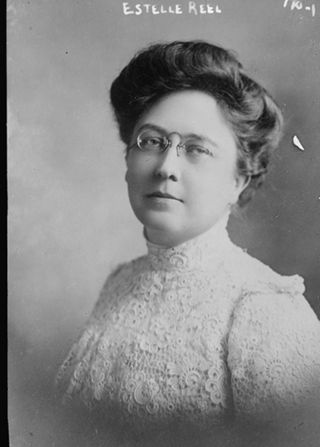From collection Candidates

Estelle Reel, an educator, campaigned for and, in 1890, was elected Laramie County Superintendent of Schools. During the campaign, she traveled throughout the county giving speeches and shaking hands. A single woman in her late twenties, she was occasionally criticized for making these trips without a chaperon. She proved effective in the position and in 1892 was re-elected to a second term. In August 1894 Reel attended the state Republican convention in Casper. Although Wyoming had enacted universal woman suffrage twenty-five years before, no woman had yet held a statewide elected position. At this convention Reel indicated her interest in breaking this barrier. After a hard fought battle, she became the party's nominee for Wyoming Superintendent of Public Instruction. She again proved a relentless campaigner, riding down mineshaft to speak with miners and traveling to remote towns. The superintendent's position required oversight of the schools. The superintendent was also, however, secretary of the state board of land commissioners. All state funding for schools came from public land leases, and sales. Reel's opponents argued that women were not capable of understanding land transactions and, therefore, should not be elected to the position of state public instruction superintendent. Reel had studied land and irrigation questions, and taken a position on the public lands act. She repeatedly argued that "any intelligent woman can perform these duties." Reel beat out her Democratic (male) and Populist (female) opponents to become one of the very first women in the United State to be elected to statewide office. She ran a dignified campaign in the face of silly stories including one account that she sent "perfumed letters" bearing her picture to "lonely cowboys," to encourage their making the long ride to a polling place. As superintendent, Reel helped to standardize curriculum, fought for free textbooks and better public libraries, and supported vocational education. She proved particularly successful in her role as secretary of the land board, increasing revenue collection and, therefore, the funds available for the state's' schools. Her success in politics reflected common sense decisions. According to a local newspaper, in 1896 she said that "the idea of running a woman for Governor of the State of Wyoming is not worthy of serious consideration." Many suffragists responded, "Indeed, and why not?" She later became a federal official in the administrations of William McKinley and Theodore Roosevelt. In an 1883 commencement speech, she argued the need for woman to "stand on her own two feet." If given the same education as boys, girls were, she believed, capable of independence. In this talk she also said that equality was a matter of practicality, woman suffrage desirable because a woman is human, not because she is an "angel," (that is, morally superior to man).Reel had systematically built a reputation within the leading associations of professional educators, as well as the national Republican party. A 1896 meeting with then-presidential candidate William McKinley, gave her the contact that she needed to advance in her public career. She campaigned for McKinley's election and when he became president submitted her name to become U.S. Superintendent of Indian Education. After nomination by the president, a unanimous Senate approved her and in June 1898 she assumed her duties. One newspaper commented, "The office is the most important to which a woman has been assigned in the history of the government." The position required that Reel balance the demands of Washington politics and extensive travel to observe the 250 federal Indian schools. Conservatives continued to attack her and to question the propriety of a woman traveling alone. One politician asked, "What would you do if you should happen to get into Washington some night, after midnight? Reel, a Wyoming woman who had campaigned in mine shafts and slept under wagons in bitter winter weather, thought that the question was "superfluous." While an official in Wyoming, Reel had supported vocational or practical education for the state's children. As Superintendent of Indian Education she pursued this policy more insistently, supporting an "intensely practical" course of study that often overlooked the liberal arts. Public life claimed Reel's time and attention until 1910 when she resigned her position and married Cort Meyer, a rancher and farmer in Toppenish, Washington. She was in her late forties and never again sought a public position.






